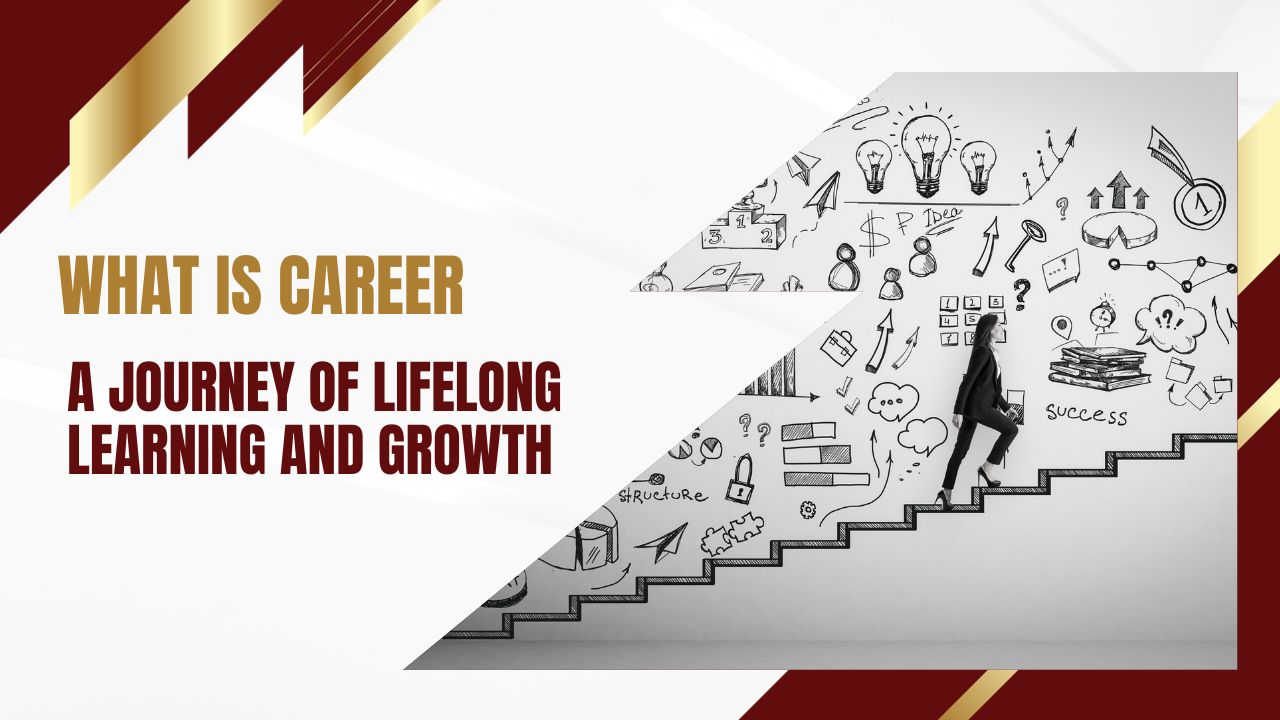“What is career?” This seemingly simple question unravels a complex tapestry of our working lives, aspirations, and the very essence of who we are as professionals. However, career is not just a job you do from 9 to 5; it’s the journey you embark on to achieve your professional goals and aspirations. In this article, In this article, we aim to answer the fundamental question, “What is career?” and how you can navigate your own career path.
What is Career?
A career is the path you walk in your working life, filled with the jobs and roles you take on to fulfill your professional ambitions. In simple terms, it’s your journey through the world of work. Think of it as a sequence of steps, each one leading you further down the road to where you want to be professionally.
A career involves more than just going to work. It’s about the bigger picture, the long-term goals, and the skills you accumulate along the way. To put it in everyday words, your career is like a story you write as you go, a journey that lasts not just for a few days, but for years, maybe even decades.
In a nutshell, your career is the path you follow throughout your working life. It includes education, job choices, skill-building, progress, networking, and sometimes even a change of direction. It’s a journey with ups and downs, detours, and surprises, and how you navigate it is entirely up to you. So, choose your path wisely, keep learning, and enjoy the adventure of your career.
Key Components of a Career
Now that you know “What is career”, it is time to dive into deeper. A career is the path you take in your working life. It’s the series of jobs and roles you engage in to achieve your professional ambitions. Your career is like a journey that can span several decades, with each job or role building on the experiences and skills gained in the previous ones. Here are some components of a career:
1. Education and Training
Your career often begins with education and training. This is the foundational stage where you acquire the knowledge, skills, and qualifications necessary for your chosen field. This phase might involve earning a degree, diploma, or certification from a school, college, or vocational training center. It’s like gathering the tools and maps you need for your journey.
Imagine you want to become a nurse. Your career journey starts with enrolling in a nursing program to gain the essential medical knowledge and hands-on skills needed to care for patients effectively.
2. Choosing a Field
Choosing a field is a pivotal decision in your career. It’s like selecting the destination for your journey. This decision is guided by your interests, passions, and long-term goals. Your chosen field determines the kind of work you’ll do, the industries you’ll be involved in, and the job opportunities that will come your way.
For instance, if you’re passionate about environmental conservation, your chosen field might be environmental science or conservation biology. This field will lead you to careers in wildlife preservation, environmental advocacy, or research in ecological sustainability.
3. Entry-Level Jobs
Most careers begin with entry-level jobs. These are like the first steps of your journey. Entry-level positions may not always be glamorous, but they serve as a starting point, allowing you to gain practical experience and get a foot in the door of your chosen field.
Suppose you aspire to work in the field of marketing. Your career might commence with an entry-level position as a marketing assistant, where you’d be responsible for tasks like data analysis, creating reports, or assisting with promotional campaigns.
4. Skill Development
As your career progresses, you’ll engage in continuous skill development. It’s akin to collecting new tools and honing your existing ones for your journey. You’ll learn to adapt and thrive in your field, keeping up with evolving technology, trends, and industry standards.
Continuing with the marketing example, your skill development might involve mastering digital marketing techniques, improving your communication skills, or becoming adept at analyzing market data to make informed decisions.
5. Advancement
Career advancement is an integral part of your professional journey. It’s like ascending through different levels on your path. Advancement can mean taking on more significant responsibilities, securing promotions, or even transitioning into roles of leadership within your field.
In the realm of healthcare, a registered nurse might progress to a nurse manager, supervising a team of nurses and coordinating patient care within a hospital or clinic.
6. Networking
Networking is like meeting fellow travelers on your career journey. Building relationships with colleagues, mentors, and other professionals can open doors to new opportunities. Networking isn’t just about who you know but also about who knows you and your skills.
Suppose you work in the technology sector. Building a strong professional network can lead to collaborations on innovative projects, job referrals, and valuable insights into industry trends.
7. Changing Paths
Sometimes, your career journey may involve changing paths or fields altogether. This is known as a career transition, and it’s like taking a detour to explore new terrain. It can be prompted by personal growth, changes in interests, or shifts in industry demand.
Imagine you’ve spent years as a software engineer but have developed a newfound passion for graphic design. Shifting to a graphic design career involves learning new skills and potentially starting at an entry-level position in your new field.
8. Retirement
Your career typically comes to an end when you retire. Retirement marks the final chapter of your career journey, where you step back from full-time work and enjoy the rewards of your labor. Some people may continue to engage in part-time work, mentorship, or volunteer activities.
Conclusion
Finally, understanding “what is career” involves recognizing it as a multifaceted journey comprising education, field selection, entry-level jobs, skill development, advancement, networking, potential transitions, and eventual retirement. Your career is a dynamic and evolving process, shaped by your choices, experiences, and continuous growth. It’s your unique journey, and how you navigate it will determine the destination you ultimately reach.




